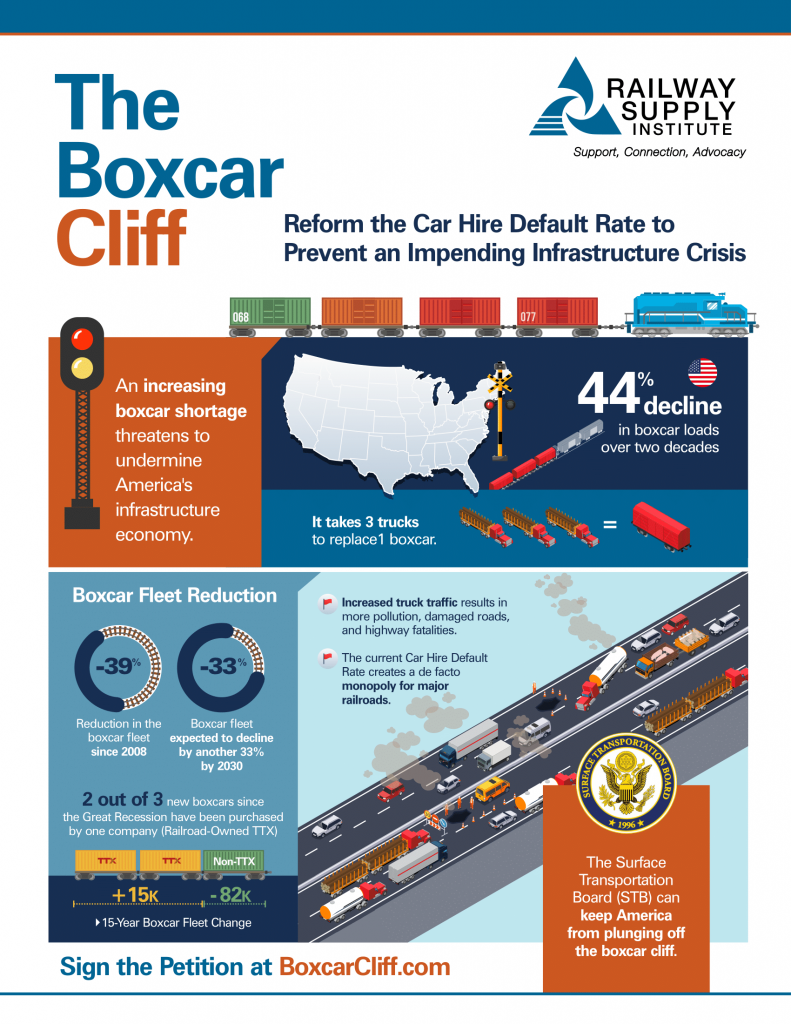Rail finds itself at a precarious moment in time, faced with decisions that will not only impact our immediate industry, but the entire ecosystem it touches, from shipper to consumer.
If you’ve been following RSI for the last few months, you may have seen advocacy efforts around the boxcar cliff ramp up. While the concept is far from new, the phenomenon of the boxcar cliff refers to the anticipated sharp decline in available boxcars, due to age and attrition.
A boxcar’s life typically ends around age 50. Given a majority of the North American boxcar fleet was built between 1975 and 1979, a vast number of boxcars are headed toward retirement, beginning next year through 2029. Pair this with an unnaturally low car hire rate mechanism that hasn’t budged in decades, and we’re faced with a growing lack of private investment incentive in the boxcar market. This is a one-two punch that, if left unanswered, will have serious consequences.
Private investment in boxcars will continue to decrease while boxcars currently serving the market will retire at a rate of 22% by 2030, a mere six years away. This is in addition to a 38% decline in boxcar fleet reported since 2008. Increased market concentration will lead to price increases for shippers, demonstrated by already high rates given limited competition in the space.
Boxcars have been losing market share since 1994, when the Default Rate mechanism became applicable, resulting in an additional 905,000 truckloads moved to highways each year. On average, every one boxcar retired translates to three truckloads to transport goods. This leads to increased truck traffic, pollution, damaged roads and fatalities, among other issues, as indicated in the infographic below.
On the shipper’s end, this incurs a higher cost, which hurts their bottom line or gets passed on to the consumer. Moreover, for publicly traded companies that have made sustainability commitments to lower greenhouse gas emissions, this also presents a serious problem, as transporting via rail is baked into such estimates. While the shift to trucking provides a short-term solution, it ultimately abandons prior investments and progress toward sustainability.
Rail is essential not just for shipping goods, but for transporting raw materials needed to create and deliver such goods. Think of the average doorstep in your neighborhood — how many packages do you see on it in a day? The bulk of paper and pulp required to create that packaging is delivered by rail. The consequences of the boxcar cliff run deep and go beyond our immediate circles.
If we’re going to make progress on this issue, urgency is paramount. From a purely logistical standpoint, it takes time to order and manufacture boxcars at the rate that is currently needed. This is why in late March, RSI formally submitted a petition that urges the Surface Transportation Board (STB) to review and reassess the existing Arbitration Rule, which governs car hire rate negotiations within the railroad industry.
While the boxcar cliff presents a number of impending challenges, the good news is we can effect change if we take action. When looking at the addressable market for boxcars today for trips over 500 miles, FTR found there are a potential 6 million truckloads annually that could be moved from the highways to rail if there was sufficient railroad service and boxcar availability.
We recognize this is a complex issue for shippers, as they navigate a delicate balance with the railroads. But we believe the data speaks for itself. According to reports from FTR, approximately 65 million tons were moved via boxcars in 2023.
RSI is pleased to be joined by a strong coalition of voices that support the petition to the STB, including the National Industrial Transportation League (NITL). “Private investment in boxcars is essential for maintaining a modern and efficient freight transport system,” Nancy Oliddy, executive director of NITL, said. “The National Industrial Transportation League fully supports RSI’s petition urging the Surface Transportation Board to review and reassess the existing Arbitration Rule governing car hire rate negotiations within the railroad industry. Addressing the declining private investment in boxcars is crucial for the sustainability and competitiveness of our members who rely on boxcars to efficiently move their goods to and from their facilities.”
The time to act is now. This issue affects all of us, reflected by the growing number of companies and individuals who are reaching out to show support and double down on the fact that this change benefits the industry at large and the many economies it touches.
This issue is a defining moment for our industry — an inflection point we can’t miss. To learn more about this important initiative, please visit boxcarcliff.com and consider adding your name to the letter addressed to the STB, urging them to take action and help us build a more secure, sustainable future for everyone.
About the Railway Supply Institute (RSI)
The Railway Supply Institute (RSI) is dedicated to advancing safety, innovation, technology, and sustainability within the freight and passenger railway supplier industry, both in North America and global markets. As the voice of the industry, RSI strategically engages in critical and urgent industry matters by leveraging the technical expertise of our members to advocate in the legislative and regulatory arenas, foster education, host impactful events, and facilitate networking opportunities. For more information visit www.rsiweb.org, follow RSI on Twitter and LinkedIn.

